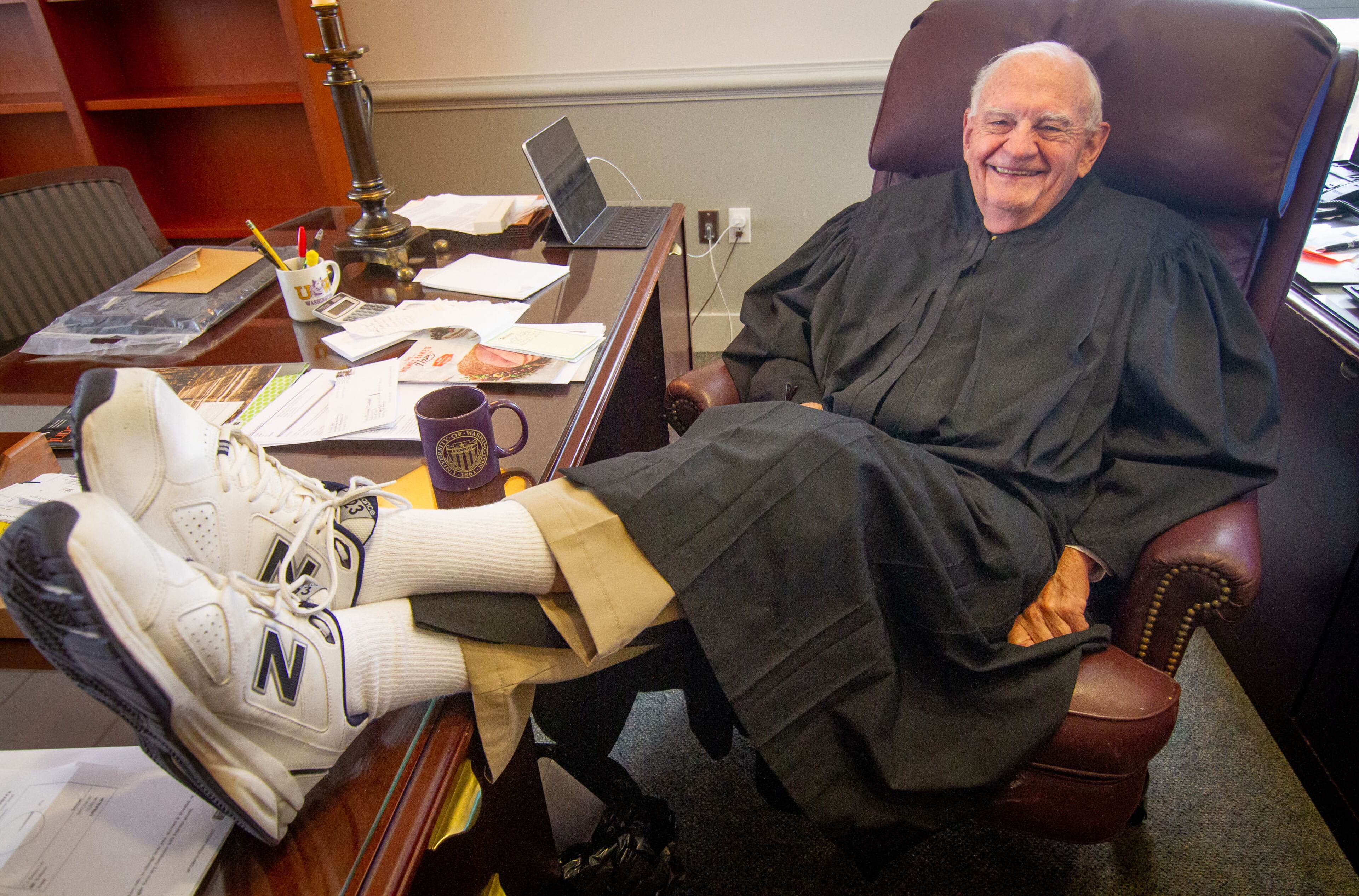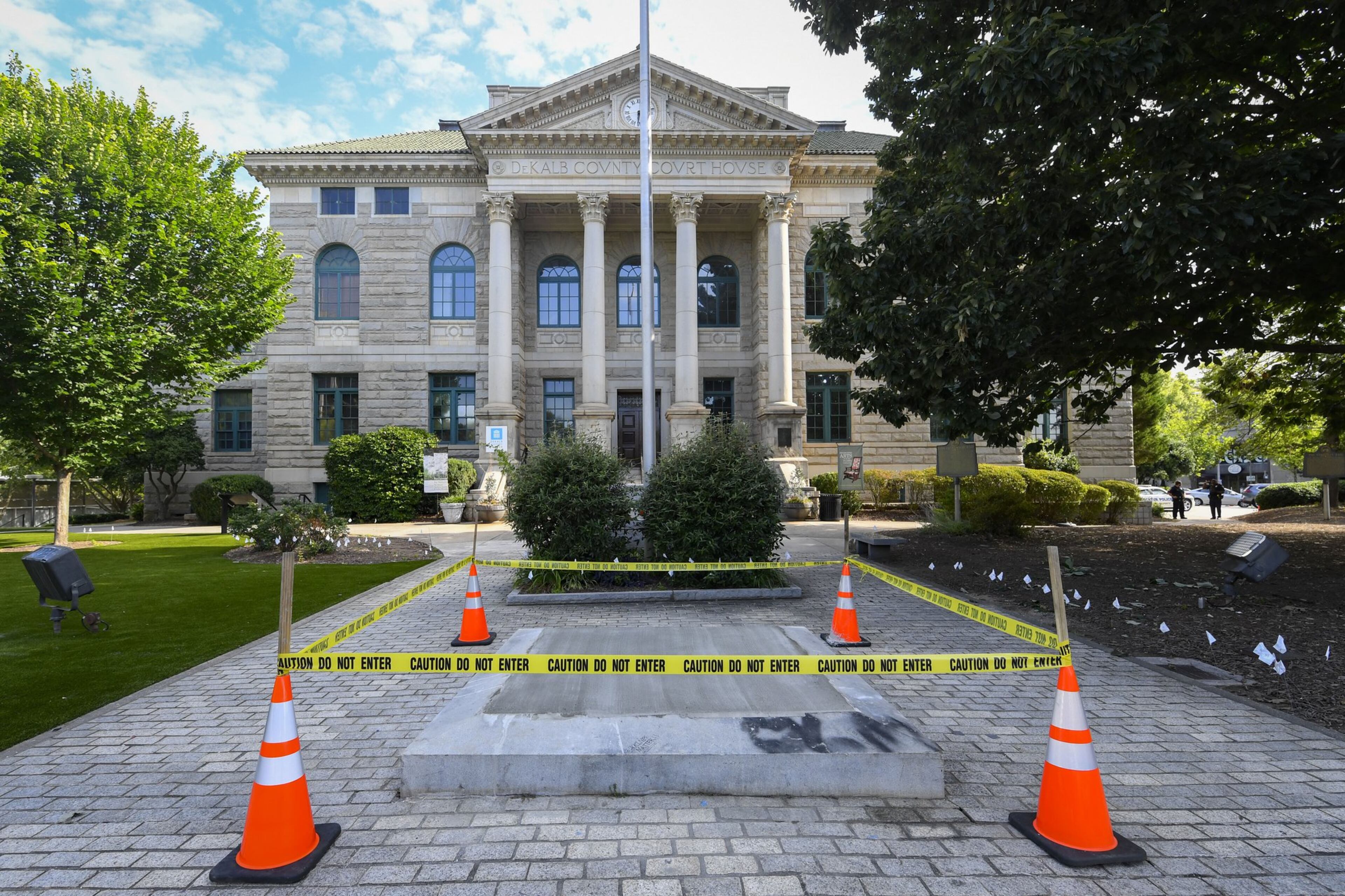DeKalb County Judge Clarence Seeliger retiring after 40-year career
It took awhile for Clarence Seeliger to notice the Confederate flag hanging in his courtroom.
Seeliger had only recently taken the bench in DeKalb County State Court, a spot he’d earned by ousting a longtime judge best known for sentencing Martin Luther King Jr. to prison. It was early 1981 and, unless you looked closely, the rebel banner in the corner wasn’t all that different from the Georgia state flag of the time, which drooped from another nearby pole.
But once Seeliger spotted it, he knew what he had to do.
On the morning of Feb. 5, in front of a crowd waiting for the day’s arraignment hearings to begin, Seeliger ordered bailiff Nesby Thomas to remove the Confederate flag. Seeliger had recently hired Thomas, making him the first Black person to work at the DeKalb courthouse as something other than a custodian. Thomas gladly obliged, laying the stars and bars to rest in a storage closet.
“I am charged with upholding the Constitution of the United States, represented by the American flag behind me, and the laws of the state of Georgia, symbolized by the state flag,” Seeliger said at the time. “Any other flag is inappropriate.”

Seeliger’s move was largely symbolic but still required gumption, 16 years or so after the Civil Rights Act was signed (and more than a century after the South lost the Civil War). It made headlines in local and national newspapers. It garnered plenty of hate mail too: “I expect to be present at your lynching,” one postcard read.
The decision also helped set the tone for Seeliger’s storied, four-decade career on the bench.
Within a few years of “evicting Dixie’s flag,” as one Atlanta Constitution headline put it, Seeliger would move on to DeKalb’s Superior Court. From there, he would build upon his reputation as a thoughtful jurist and an outspoken advocate for domestic violence victims.
He would preside over one of the most contentious cases in Atlanta history, effectively stopping a highway from being built through the heart of several local neighborhoods. And, decades later, he would issue the order allowing a long-standing Confederate monument to be removed from its perch on the Decatur square.
The latter happened just this summer and, as 2020 nears its end, Seeliger’s career is winding down too.
The newly minted octogenarian did not seek reelection this time around. Come January, his seat will be filled by a former Fulton County public defender, Yolanda Parker-Smith.
As Seeliger prepared for retirement, he said it’s nice to be remembered and recognized for the things he’s done. But he doesn’t like to take credit for, in his mind, simply doing the job that he was elected (nearly a dozen times) to do.
“I just happened to be here,” Seeliger says. “And may have helped edge things along from time to time.”
‘Restoring dignity’
Clarence “Chuck” Seeliger grew up in Seattle, Wa. during the 1940s and 50s, then came to Georgia for a woman.
He’d met Gwen Hagler while training for the Air Force, which he’d joined as war brewed in Vietnam. Gwen was an engineer working in the space program before she landed a job at the Lockheed Corporation in Cobb County.
After the service, Seeliger was accepted to Emory University’s law school and followed his future bride to the Peach State.
In the summer of 1968, Seeliger interned at the Southern Regional Council, rubbing elbows with civil rights legends like John Lewis and Julian Bond. After law school, Seeliger started a private practice.
Several years later, a young Black attorney named Dwight Thomas — the son of Nesby Thomas, Seeliger’s future bailiff — was looking to open his own practice in Decatur. Frustrated after being repeatedly turned away from office spaces because of his race, Thomas mentioned it to Bond and state Sen. Leroy Johnson.
Both told him to see Seeliger.
Seeliger immediately agreed to rent him space in the home he’d converted into an office. That made Thomas the first Black attorney based in Decatur’s city limits.
“It meant a lot that he would open his doors to me,” Thomas said recently. “I was just a guy trying to hang a shingle.”
In 1979, Seeliger, by then an experienced defense attorney, decided on his next career move. He was eyeing a state court judgeship. He wanted to take down J. Oscar Mitchell.
Mitchell was a 30-year incumbent with a booming voice and an iron fist. He was known for briefly sending Martin Luther King Jr. to a hard labor camp in Reidsville in 1960 after a dubious traffic stop. (Robert Kennedy eventually intervened on behalf of his brother’s presidential campaign and King was released.)

As a young attorney, Seeliger had watched while Mitchell lambasted one of his clients — a single Black mother charged with receiving too much government assistance — for the benefit of a reporter he’d summoned just for the occasion.
As Seeliger recalls, Mitchell called the woman everything but the n-word. She was shaking and crying, one of many Black people Mitchell mistreated in court.
DeKalb’s Democratic power brokers were not happy about Seeliger, then just 39 years old, challenging Mitchell. But Nesby and Dwight Thomas were in his corner, as were other young lawyers like Wayne Purdom (now DeKalb’s chief State Court judge), Hank Johnson (now a member of Congress) and Mereda Davis Johnson (now a DeKalb County commissioner).
In a TV ad the campaign surreptitiously shot in Mitchell’s courtroom, they talked about how the incumbent “disposed of criminal cases behind closed doors” and often had decisions overturned on appeal, Seeliger said.
They talked about “restoring dignity to the courtroom.”
In a what seemed like a longshot bid, Seeliger beat Mitchell soundly. No one has defeated a sitting DeKalb County judge in an election since.
One of Seeliger’s first moves was hiring Nesby Thomas as his bailiff. Within a few years, about 20% of the DeKalb State Court staff was Black.
‘Our hero’
In 1984, Seeliger won a post in DeKalb Superior Court, which handles the county’s most serious cases. He’s been there ever since.
Seeliger has presided over thousands of cases: murders and lawsuits and just about everything else.
Domestic violence cases always resonated. He took up prevention as a cause, serving as chairman of the DeKalb County Task Force Against Domestic Violence and then the Georgia Commission on Family Violence. He helped draft legislation on protective orders and other issues. The DeKalb-based Women’s Resource Center recently named an award after him.

Seeliger’s most high-profile case, though, ended with him having effectively prevented officials from ramming a four-lane parkway through several Atlanta and DeKalb County neighborhoods.
In a years-long fight in the 80s, the Georgia Department of Transportation — and Atlanta Mayor Andrew Young and former President Jimmy Carter — wanted to build a four-lane highway through several intown neighborhoods. The project was dubbed the “presidential parkway.”
Well-organized groups of residents from Virginia-Highland, Poncey Highland, Druid Hills, Inman Park, Candler Park, Lake Claire and others were outraged and tried to kill the plan in court.
Seeliger, who presided over the grappling for six years, denied a DOT petition to condemn the public land necessary for the project and issued an injunction completely stopping construction. In 1991, he helped push the two sides to compromise.
A much shorter stretch of highway, now known as the John R. Lewis Freedom Parkway, was the result.
Gale Walldorff was a board member of one of the resident groups at the forefront of the fight.
“Our hero,” she recently called Seeliger.
“It really would’ve just completely decimated this part of town,” said Walldorff, who later became a DeKalb County commissioner. “And these communities now that are thriving ― it just wouldn’t have happened.”
Making a change
Earlier this year, as the coronavirus pandemic and protests over systemic racism and police violence raged, a new case landed in Seeliger’s court.
The Confederate obelisk on the Decatur square — a 30-foot pillar erected in 1908 to pay homage to the “covenant keeping race” of soldiers that fought against the United States in the Civil War — had become a frequent target of graffiti and a magnet for protests.
The city wanted Seeliger to declare it a public nuisance and order DeKalb County, the monument’s reluctant owner, to take it down.
The nuisance approach was an attempt to circumvent Georgia state laws protecting Confederate monuments.
In a June 12 order, Seeliger called the obelisk a “lightning rod for friction among citizens, and a potential catastrophe that could happen at any time if individuals attempt to forcibly remove or destroy it.”
The obelisk fell a week later, as the night of June 18 turned into the morning June 19 ― Juneteenth, a day when many Black Americans commemorate the day in 1865 when slaves in Galveston, Texas, finally learned that they were free.
The date of the removal hadn’t been announced beforehand, but word spread fast and a crowd quickly assembled. They cheered as a crane lifted the obelisk off its perch chunk-by-chunk. Champagne flowed.
“He’s leaving just like he came in,” said Davis Johnson, the county commissioner who worked on Seeliger’s original judicial campaign. “Making a change.”

The county has changed too. When he took the bench, DeKalb was mostly white. Now it’s mostly Black, and the judges reflect that. Nine of 10 on the Superior Court will be Black when he’s gone.
Back in 1981, when Seeliger asked the bailiff to pull down the flag, the judge got enough hate mail to stack it an inch-and-a-half tall.
When he issued the order to remove the obelisk on the square? One phone call from the Sons of Confederate Veterans, one letter from another Georgia judge curious about his order — and that’s it.
“I think my story is interesting mainly because it does show the transition of the county,” Seeliger said. “And I think that’s kind of important.”


